Afghanistan War, Civil Liberties, Criminalizing Dissent, FBI Intrusion, Green Scare, Guantanamo, Habeas Corpus, Human Rights, Iraq Veterans, Iraq War, Political Prisoner, Surveillance, Targeting Muslims, Torture, Truth to Power, War Resister
Podcast: Play in new window | Download
Updates:
—

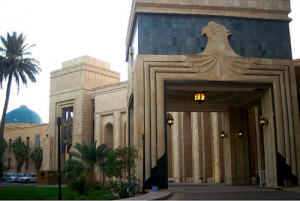
The State of Perpetual War
Since September 11, 2001 the US global war on terror has reached beyond Afghanistan and Iraq. The US constructed the largest embassy ever in Baghdad to control the resources of Iraq. Meanwhile strikes against Pakistan, Yemen, and Somalia, led an air war against Libya without any Congressional authorization continue as pointed out by author Anthony Arnove. In his article titled The 10th Anniversary of 9/11 Arnove describes US foreign policy of preventive war and how the US continues to use drone strikes against Pakistan, Yemen and Somalia. Now other countries are adopting the preventive war idea to fight (quote) terrorism. Today, the Obama Adminstration has gone beyond the Bush policies as trillions are spent on perpetual war while schools, health care and social needs crumble.
Anthony Arnove:
- 911 was seized upon by the Bush Administration as an opportunity. Condoleezza Rice specifically used the word opportunity to describe the geo-political shifts that she saw occurring in the wake of 9-11.
- We’ve seen the invasion of Iraq, the invasion of Afghanistan, covert operations and Arab bombardment of dozens of countries. There’s an estimate now that this year the US will be operating in 120 countries in some capacity through use of commandos.
- You’ve seen increased troop levels in Afghanistan so that even with the current so called draw down of the troops in Afghanistan, even with the reductions that are currently being undertaken, we’re still going to be ahead of the number of troops that were in Afghanistan at the end of the Bush Administration.
- Withdrawal, the word no longer has any meaning. It actually means slight reduction of troops after they’ve been increased.
- There are 46 thousand active duty troops in Iraq. The claim is that those 46 thousand will leave at the end of 2011 after an agreement reached under pressure from social movements in Iraq.
- Then you look at the military installations that scatter the country, they’re not going to walk away from that easily.
- In Afghanistan, they’re literally talking about dates as far as 2024 in terms of troops on the ground involved in a number of capacities.
- I think Libya is truly an opportunistic action by the United States concerned its losing control in the middle east. You’ve had uprisings and revolutions that have toppled governments aligned with the United States.
- The US has been so contemptuous of the freedoms of people around the world. So contemptuous of democracy, so contemptuous of people fighting for self determination.
- So contemptuous of nationalist movements that would have put resources into the control of the people.
- The actions of the Bush Administration and now Obama have only made us more hated, and made the world more dangerous.
- They claim they’re making the world more safe, and protecting us. The reality is the opposite.
- At least Barack Obama will be more responsive to social movements, we’ll be able to pressure him. It is clear that is not the case, there has been a demobilizing of sections of the anti-war movement who define the political horizons as the debate between the Republicans and Democrats.
- The anti-war movement has been silenced.
- The people who most vociferously supported invading Iraq, claimed there would be weapons of mass destruction, all of those things we now know to be lies, those people are regularly asked to be commentators on Iraq and Afghanistan.
- Yet the people who got it right, saying this is what will happen if we invade, those people are never heard from.
- The gap between what the elite are doing and what they are saying, and what is in their interest and the interest of ordinary people has never been wider.
- On October 6, 2011, a number organizations have called for demonstrations in Washington DC and solidarity actions in other cities. On October 15 actions have been called for by the United National Anti-War Coalition. NationalPeaceConference.org
Guest – Editor and writer Anthony Arnove. He is best known for his books on Iraq and the Iraq War. Arnove is the author of the book Iraq: The Logic of Withdrawal, published in hardcover by the New Press and in paperback by Haymarket Books. Arnove toured the country promoting the book in spring 2006 as part of the New Press’ “End the War Tour”.
Arnove is also the editor of Iraq Under Siege, published by South End Press, the co-editor with Howard Zinn of Voices of a People’s History of the United States, published by Seven Stories Press, and the editor of The Essential Noam Chomsky, published by the New Press. He writes frequently for left-wing publications; he is a featured author at ZNet, a columnist for Socialist Worker, and on the editorial board of the International Socialist Review.
—
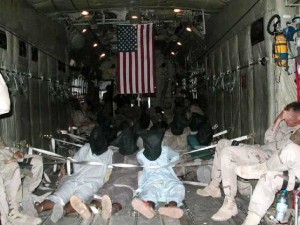
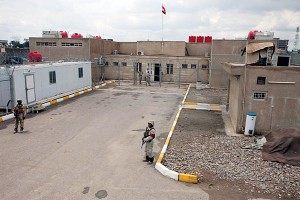
The Guantanamo Syndrome
Attorney Michael Ratner:
- Pinochet’s Operation Condor was to round up opponents all over the world to torture and imprison them. This is now an American Operation Condor.
- AUMF and Military Order #1 allow the administration to use drones around the world. This is the key piece of legislation. Out of the AUMF came military order # 1, November 13, 2001. The president can arrest anybody, they can be kept anywhere, American citizen or not.
- From there flows the Guantanamo Syndrome. Habeas Corpus, a person who’s the prisoner of the executive can go to court and say put the executive on the defensive. Why am I being held? You have to have a legal basis.
- After many years of litigation representing this incommunicado people at Guantanamo, we ended up representing their parents or relatives, because we couldn’t represent them, the Supreme Court finally said, it’s a Constitutional right to go to court to test your detention. They said that about the people in Guantanamo in particular, they didn’t say that about the people in Baghram or other places.
- Once we won that right, the Bush Administration and the Obama Administration went into court and completely opposed that right having any meaning. It is really an unrecognizable world from what we had ten years ago.
—-
Audio Collage
- Surveillance State: The 51st State
- Targeting Muslims Since 9-11
——————————————————————
Civil Liberties, Criminalizing Dissent, Death Penalty, Guantanamo, Habeas Corpus, Human Rights, Political Prisoner, Torture, Truth to Power
Podcast: Play in new window | Download
Updates:
—
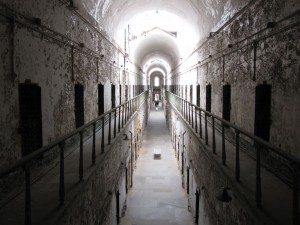

Cruel Solitary Confinement In Pennsylvania Prisons
Earlier this year the National Lawyers Guild called on Superintendent Louis Folino to support the Program Review Board’s recommendation to release Russell Maroon Shoatz into the general prison population at SCI Greene in Waynesburg, Pennsylvania.
Jerome Coffey, a political prisoner currently being held in Pennsylvania’s SCI Forrest. Jerome’s social work while in prison include sending clothes to villages in Uganda and to women prisoners in the Philippines. That work has labeled him an instigator and he’s been placed in solitary confinement for more than 5 and a half years.
Bret Grote:
- The Human Rights Coalition was founded by state prisoners at the State Correctional Institution in Greene, Pennsylvania in 2000. The Pittsburgh chapter where I work was founded in 2006-2007.
- The main mission of the Human Rights Coalition was to bring the voices of the most excluded from criminal, legal, criminal justice discussions, namely those of prisoners, their family members and effected communities.
- We base our work in building relationships with prisoners and to bring support and advocacy to those most impacted by the prison system and that has led us straight into solitary confinements where people’s lives are being micro-managed down to the most minute details.
- The justifications for solitary confinement shift from to another, it used to be based on escapes. Now that Russell Maroon Shoatz is approaching his 70th birthday, they’re claiming its because of his past efforts of organizing hunger strikes, and they cite an incident where he was forced to defend himself against another prisoner.
- In Maroon’s case he met with a prisoner mental health staff person because there was some movement towards releasing him from solitary confinement that ended up being blocked.
- This staff person told him there was an allegation that he tried to organize an armed prison uprising in the 80’s. This has been following him around for over 25 years in his file, but he has not been able to challenge this because he was not informed of this at all.
- He is not represented by legal counsel. He is ripe for representation under the 8th amendment clause of cruel and unusual punishment.
- The prison authorities typical treatment for somebody who is the restrictive housing unit is a cursory interview at the cell, maybe once every 30 days with a staff worker, which is to say they’re not really giving them effective mental health treatment.
- You spend 23 hours in the cell, maybe 24 if the guards don’t take you to yard or shower.
- The things that one may witness on the whole are constant screaming, banging, and yelling and crying and cursing and talking to one’s self by prisoners who are psychologically disturbed. According to the figures up to 2500 or 3000 prisoners can be in solitary confinement on any given day in Pennsylvania. The total prisoner population in Pennsylvania is 52 thousand.
- We are constantly looking for serious and committed civil and human rights lawyers to work with us. We have a massive body of evidence. The solitary confinement system is an invisible system inside of a larger invisible system of the prisons.
Guest – Bret Grote, law student and volunteer with the Human Rights Coalition, an organization bringing the voices of the most excluded from criminal, legal, criminal justice discussions, namely those of prisoners, their family members and effected communities. The HRC works to build relationships with prisoners and bring support and advocacy to those most impacted by the prison system.
——

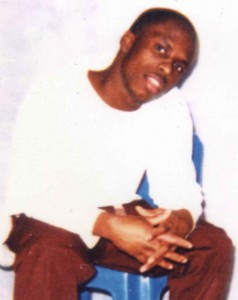
Andre Jacobs
Andre Jacobs is another Pennsylvania state prisoner in solitary confinement. Andre, a 27 year-old jailhouse lawyer, has been held in retaliatory solitary confinement for more than 8 years. In 2009, Andre was awarded 185 thousand dollars in a case against the Pennsylvania Department of Corrections, an action that has resulted in his being singled him out for abuse within the prison system. In January of this year, he was physically abused, issued death threats and denied medical treatment.
Liz Springer:
- It’s been rough, there had been days where I thought he wasn’t going to make it. I thought I was going to get a call saying he was dead. I send him inspiration cards, and support him, send him some Bible verses to keep him strong.
- There have been times he said to me, I can’t do it no longer, I can’t do it.
- They were beatin’ him in the court room. They said he had an attitude and when he was leaving the court room, I witnessed them beating him, and I said, “I love you Andre.” He turned around and said “I love you too.”
- They started beating him because they said he wasn’t supposed to speak to me.
- He lost that case because the guards got on the stand and said he hurt one of the guard’s wrist.
- He ended up with 18 years because of that. Lately he has a little hope.
- He was strapped to a chair for 12 hours not being able to move anything but his head. Didn’t eat, had to go the bathroom and he just went.
Guest – Liz Springer, activist and the grandmother of Andre Jacobs.
———
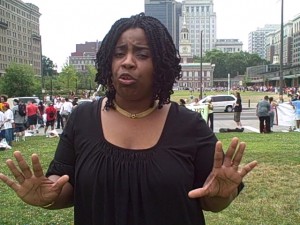
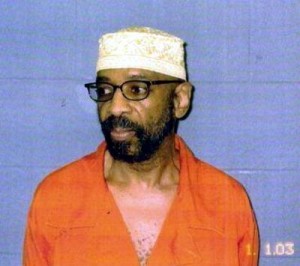
Russell Maroon Shoatz
As many listeners may know, former Black Panther Russell Shoatz has been in prison since 1972, and the past 21 of those years has been spent in solitary confinement. He’s 67, his spirit unbroken and in addition to his record of good conduct, members of the Pennsylvania Prison Society who visit Mr. Shoatz regularly attest to his peaceful disposition. Earlier this year the National Lawyers Guild called on Superintendent Louis Folino to support the Program Review Board’s recommendation to release Russell Maroon Shoatz into the general prison population at SCI Greene in Waynesburg, Pennsylvania. His daughter Theresa Shoatz joins us talk more about his advocacy work and life as a political prisoner.
Theresa Shoatz:
- The solitary confinement has had the worst effect on us. Within the 39 years we was able to have contact visits.
- The unit he’s in now, there’s no contact, you’re behind a glass when you visit.
- He’s had grandchildren since that time, and he hasn’t touched the grandchildren either. Our family is dedicated to visiting him, every 3 months.
- Russell Shoatz being known throughout the country. I notice now, his conversations are laid back, he’s not as upbeat as he used to be.
- He keeps stressing almost on our weekly calls, you gotta get me outta here.
- They told me Daddy’s a leader, I said no, he’s a grandfather. The Panthers didn’t say we want to battle the police. They said, we want to educate our youth, we want to feed them, we want to take control of our community. When it became war, and the Panthers were under attack, they said we got to protect ourselves.
- That’s what happened, and of course, Daddy’s a political prisoner. He took a stand and stood on the front line for his people and his community.
- I had a little attitude with him, I said why would you leave us, this was some years ago. He said, (I did it for my people. How could I allow you to be raised in that type of system?) It hit me like a ton of bricks.
- The guards, they called themselves the “wolfpack” when you’d see them comin, they would roll one pants leg all the up to the knee.
- I went to Governor’s office, the Governor of Pennsylvania. I was on trains, back and forth.
- It’s the same thing, when our people get in the streets and march, you really can’t do one march.
- At SCI Greene, over 20 young men in their 20’s hung themselves there (lynching) within a short time of solitary confinement.
- Daddy was constantly yelling to the guys, what to do. They come in strollin. Strollin down the solitary unit.
- This prison bubble is going to burst. There are people fighting on all levels, this prison bubble is going to burst.
- It’s going to end, we’re going to make sure of that.
Guest – Theresa Shoatz, daughter of political prisoner Russell Shoatz and activist with the Human Rights Coalition.
————————————————————
Civil Liberties, Crony Capitalism, Guantanamo, Habeas Corpus, Human Rights, Surveillance, Truth to Power
Podcast: Play in new window | Download
Updates:
- Tim DeChristopher Sentencing – Bidder # 70
- Aaron Schwartz, Anonymous Activists and Paypal
- Australian Government Seize Profits from David Hicks’ new book – Guantanamo, My Journey
—-
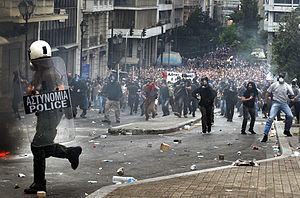
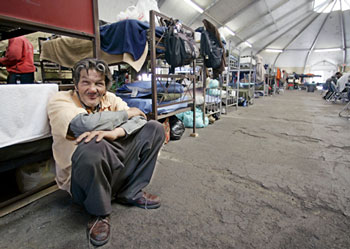
From Economic to Social Crisis: Deficits, Debt and a Little Class History
We welcome returning guest Rick Wolff, Professor of Economics. We talk with him about his latest article, From Economic to Social Crisis: Deficits, Debt and a Little Class History. Earlier this year Rick pointed out how the Democrats and Republicans debate over spending cuts at around 40 to 60 billion. Rick says the debate is inconsequential, when the federal budget’s projected deficit of $1.5 trillion will carry an annual interest cost of $40-60 billion. Now, as both parties are committed to a broken, corrupt system, Rick points out that historically transitioning to another economic system is not in the public discussion. He says, the tools used to recover from the 1930s economic collapse can’t be used today mainly because of the last 75 years of rising national debt and budget deficit.
Professor Rick Wolff:
- This is mostly theater, the people I talked to in the business of finance and government are quite clear that the United States will work this out.
- It is a sign of the political dysfunction that they can’t do it in a reasonable way.
- It is a normal procedure to periodically ask for the debt ceiling to be raised, so that they can borrow the amount of money stipulated by the budgets they have passed. The sitting president asks for the debt ceiling to be raised, Bush did it eight times. It’s normal.
- The only thing the Democrats have left, to not look defeated, is to make a big deal out of the cuts they’re willing to accept are smaller than the “draconian” version that the Republicans want.
- The Republicans don’t know, the Democrats don’t know (what will happen). They fundamentally don’t care, because they have long ago decided that their political needs and strategies are unhooked from the underlying economic situation.
- We’re spending 3.5 trillion dollars this year as a Federal Government. We’re raising 2 trillion. That means 1.5 trillion has to be borrowed otherwise its not going to happen.
- That’s money that will be used to help old people’s needs, help fight wars in Iraq, Afghanistan, Libya, Pakistan, to help cities and states that need support, etc.
- The actual creditors in the immediate situation have nothing to fear.
- For the rest of the world you have a double whammy, which is what we should be thinking about.
- We have the driver of the world’s economy collapse in 2007/2008 and having been unable to recover since.
- The bottom line is this economy isn’t working well and isn’t solving its crisis. This is now a deeper, longer crisis than any since the Great Depression.
- That means every other player in the world, from a Chinese official, to a Spanish bank to an investor in Brazil has to rethink what he or she thought.
- A thousand small decisions are going to be made a little differently from now on.
- There is no proposal working its way through Congress to provide employment to the tens of millions of people who have no work.
- The president’s statement (is a bipartisan commitment to ignore the problem of unemployment.)
- The most extreme proposal is to cut 4 trillion dollars in the next ten years. This year alone the US deficit will run one thousand five hundred billion. 1.5 trillion.
- The debtors know that at a certain point there’s going to be trouble.
- You can’t continue to cut the masses’ standard of living to make money for big bankers, that’s not a political sustainable program. Not here, not in Greece, not anywhere else.
- The silence of the press here is stunning. There have been multiple general strikes across Europe.
- The greed of the corporations, they’ve had their way for 30 years. Republicans and Democrats alike, have basically gone in the direction they want. Corporate taxes have been cut, regulations relieved, money is everything, wealth is everything, consumption is where you are.
- The smaller business (corporations, etc) are late to party. They still want to get theirs. Those who already got theirs don’t want them to mess up the game. I believe you will see big splits emerging among the Right in America because these are different attitudes.
- They want a stable United States so that they can grow in the rest of the world, because that’s where they think growth is coming.
- They don’t need to maintain the roads like they did, they don’t need to maintain the education in this country.
- You can appeal to them, you need these workers, you need these consumers. No we don’t. We don’t need them as workers, and we don’t expect them to be much in the way of consumers, because they would have to borrow and we’re not going to lend to them.
- They would have to have higher wages, and we’re not going to give that to them. We have no reason to, we have cheaper better workers elsewhere.
- You are subjecting your working class to a major sustained attack on its standard of living. To believe this is all going to happen and they’re quietly going to sink some resignation with no consequence is nutty.
- The attempt to isolate, to freeze, to inoculate the population so they don’t fear what’s coming. It’s falling apart in Europe, but it will fall apart here too.
Guest – Richard D. Wolff is Professor of Economics Emeritus, University of Massachusetts, Amherst where he taught economics from 1973 to 2008. He is currently a Visiting Professor in the Graduate Program in International Affairs of the New School University, New York City. He also teaches classes regularly at the Brecht Forum in Manhattan.
Afghanistan War, Civil Liberties, Extraordinary Rendition, FBI Intrusion, Guantanamo, Habeas Corpus, Human Rights, Surveillance, Targeting Muslims, Torture, Truth to Power, War Resister
Podcast: Play in new window | Download
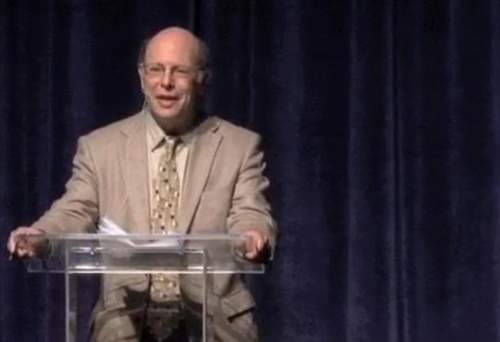
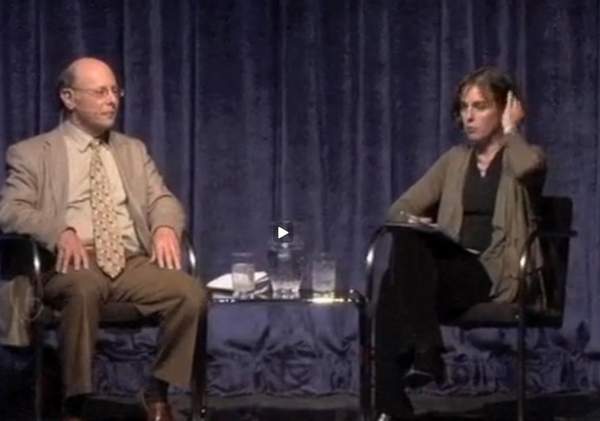
Ten Years after 9/11: War, Operation American Condor (Guantanamo) , Civil Liberties and Hope
We hear a talk from our own Michael Ratner who spoke at the James A Little Theater in Santa Fe, New Mexico. He was also in conversation with radio host Mary Charlotte Domandi. The event was titled – Ten Years after 9/11: War, Operation American Condor (Guantanamo) , Civil Liberties and Hope.” Michael is introduced by Mary-Charlotte Domandi producer and host of the Santa Fe Radio Cafe on KSFR 101.1 FM (Santa Fe, NM, Public Radio)
Michael Ratner is President of the Center for Constitutional Rights (CCR) in New York and the European Center for Constitutional and Human Rights (ECCHR) in Berlin. Both are non-profit human rights litigation organizations. He was part of the small group of lawyers that first took on representation of the Guantánamo detainees in January 2001, a case that resulted in a victory in the Supreme Court in 2004. CCR established a network of over 600 pro-bono lawyers to represent Guantánamo detainees and continues that work.
He has filed criminal complaints in the courts of Germany, France and Spain against former US officials including Secretary of Defense Rumsfeld seeking the initiation of criminal prosecutions against them for the Abu Ghraib abuse and torture as well as for their actions at Guantánamo. Recently, CCR and ECCHR prepared papers to file in Switzerland against George W. Bush for torture. As a result Bush canceled his trip. A major area of Mr. Ratner’s litigation and writing is the enforcement of the prohibition on torture and murder against various dictators and generals who travel to the United States. He has sued on behalf of victims in Guatemala, East Timor, Haiti, Argentina, among other countries. He has also litigated numerous suits to prevent or stop illegal US wars ranging from Central America to Iraq. A constant in his work has been litigation against government spying and surveillance of activists.
Michael Ratner’s books, authored or coauthored, include the soon to be published, Hell No: Your Right to Dissent in 21st-Century America (2011) and Killing Che: How the CIA Got Away with Murder (2011). Other books include International Human Rights Litigation in U.S. Courts, Second Edition (2008); Against War with Iraq (2003); Guantánamo: What the World Should Know (2004); and The Trial of Donald Rumsfeld: A Prosecution by Book (2008). Ratner has taught human rights litigation at Yale and Columbia Law Schools. A past president of the National Lawyers Guild, Ratner has received many awards including Trial Lawyer of the Year, the Columbia Law School Medal of Honor (2005), the North Star Community Frederick Douglass Award, Honorary Fellow at the University of Pennsylvania Law School (2005), and The Nation Institute/Puffin Foundation Prize for Creative Citizenship (2007). In 2006, the National Law Journal named Ratner one of the 100 most influential lawyers in the United States.
—-
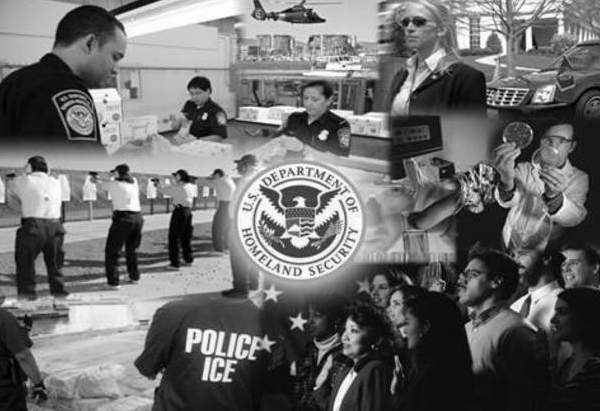
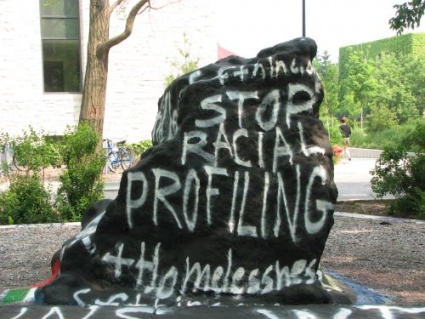
Right-Wing Firms Train Public Servants on Terror Threats
There is a sprawling hidden world of counter-terrorism organizations growing beyond control in the United States. Twenty-four of them were created by the end of 2001, including the Office of Homeland Security and the Foreign Terrorist Asset Tracking Task Force. The next year, 37 more were created to track weapons of mass destruction and collect threat tips. By 2009, nearly 260 organizations were created as 854 thousand civil servants, military personnel and private contractors with top-secret security clearances monitor national security concerns. However, according to a report from the Public Research Associates, those same concerns have bolstered a class of self-proclaimed terrorism experts who decry Islam as an evil religion of terrorists and routinely brand Muslims as primitive, vengeful, duplicitous, and belligerent people who oppress women and gays, and have values irreconcilable with “western Judeo-Christian civilization.”
In fact, when PRA discovered earlier this year that the Massachusetts Bay Transportation Authority (MBTA) had contracted with Security Solutions International to conduct a training on radical Islam, they notified the Muslim American Society, ACLU, and our other advocacy partners, who used PRA’s research to compel the MBTA to cancel the agency’s training.
Chip Berlet :
- As part of the Homeland Security Initiatives and working with the FBI in other aspects of the national security apparatus, there was a need to train thousands as part of a local state and federal counter-terrorism “experts.”
- Some of these trainings are quite good. The problem is that there are a handful of groups that train hundreds and hundreds of local, state and federal counter-terrorism experts, with rhetoric that is basically Islamophobic.
- In the late 1970s there was an attempt to restrain this illegal surveillance. I’d have to say right now it’s worse.
- What used to be done illegally and covertly is now done ostensibly legally and openly and in fact proudly by both Democrats and Republicans who should be ashamed.
- The whole strategic suspicious reporting initiative which basically is a pipeline for unverified rumor and innuendo through local police departments up through a chain of information agencies to the federal government. We know in Europe this kind of reporting is unconstitutional and bad for society.
- Now, everyone that was considered illegal and unconstitutional for which there were Congressional hearings and reforms under Jimmy Carter, now we do it.
- In proper training that is actually looking for criminal activity, not people of color who wear garb that we’re scared of. What’s going on here is untrained, badly trained officers are reporting the names of people up into a huge infrastructure of information data storage, based on bias they’ve not been trained to resist or confront within themselves.
- We described this whole process as a platform for prejudice in a report by Tom Cincotta
- Tom has on his wall a wall chart of all the agencies of this information reporting system and it has 150 dots so inter-connected, no one can control this.
- I’m urging people to form broad coalitions across the political spectrum.
Guest – Chip Berlet, (senior analyst) is a veteran freelance writer and photographer who specializes in investigating right-wing social movements, apocalyptic scapegoating and conspiracism, and authoritarianism. A PRA staffer since 1982, he has written, edited and co-authored numerous articles on right-wing activity and government repression for publications as varied as the Boston Globe, the New York Times, The Progressive, The Nation, The Humanist, and the St. Louis Journalism Review.
Civil Liberties, Criminalizing Dissent, Habeas Corpus, Human Rights, Iraq War, Supreme Court, Truth to Power, War Resister
Podcast: Play in new window | Download
Updates:
——–
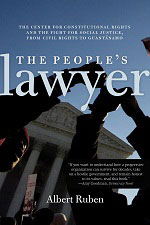
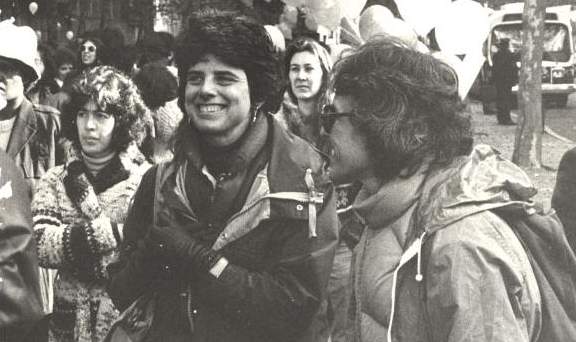
The People’s Lawyer: The Center for Constitutional Rights and the Fight for Social Justice, From Civil Rights to Guantánamo
The People’s Lawyer by author and Guild writer Albert Ruben, is the first comprehensive history on the Center For Constitutional Rights and tells the Center’s story from the civil rights era to today’s legal battles on habeas corpus, torture and Guantanamo Bay Prison. The book highlights critical legal fights taken on by CCR revealing innovative tactics that have evolved within the radical organization. Albert Ruben points how the Center for Constitutional Rights continues to fight with the same spirit, audacity and courage it was founded with. As many listeners may know, CCR has been an important corner stone to this radio show because our own Michael Ratner has been with the Center for 4 decades.
Albert Ruben:
- The founders (of CCR) were 4 in number. They were Arthur Kinoy, Morton Stavis, Bill Kunstler and Ben Smith. Smith was a Southerner, he had an office in New Orleans, and Stavis, William Kunstler, and Arthur Kinoy were northerners who were working for civil rights in the South.
- They were all working their separate beats, they all knew each other and were in communication about the work they were doing. They decided that they needed something, primarily financially, to keep their work going.
- So they got in touch with a lawyer they all knew with financial means named Robert Boem. They incorporated it in New Jersey, and it became ultimately the Center for Constitutional Rights.
- They had a very small office at the beginning with one lawyer in Newark.
- The anti-war movement, the McShirley Case. It threw the Center into the government misconduct orbit. It was in the course of litigating that the Center became aware that the Federal Government was not going to be on the side of the angels.
- (From Wikipedia) Dombrowski alleged that members of his organization, the Southern Conference Educational Fund, were subjected to continuous harassment, including arrests without intent to prosecute, and seizures of necessary internal documents. Furthermore, the State was threatening to use anti-subversion statutes to prosecute the organization, which was a group of Southern liberals dedicated to fighting for civil rights for Blacks in the South.
- The Dombrowski case, allowed the Center and a lot of lawyers to use that decision to challenge cases that brought against civil rights attorneys and a lot of people who were working in the South and caught up in state laws, that were using anti-red laws to take them out of state courts and bring them into federal courts.
- So, the Center lawyers were very acutely aware that they had on their side the federal courts. What happened with McShurley, was that it overturned that faith in the federal court system. The case led the Center to realize that government misconduct was an area that would be of interest. They could no longer count on federal court to be their allies.
- There were women on the staff of the Center who were both Center lawyers as their occupation but they were also women, and as women they were caught up in the womens movement. They brought the two together.
- It was the early days of the womens movement. The Center didn’t see itself as a place that would take on criminal law, it was more of a movement organization. The politics of the founders were central to their beings. They made their politics guide them in whether a case was something that they should adopt.
- Part of the Center for Constitutional Right’s mission was educational, that’s not understood I think.
Guest – Albert Ruben, screen and television writer and has served as an officer of the Writers Guild of America East.
—
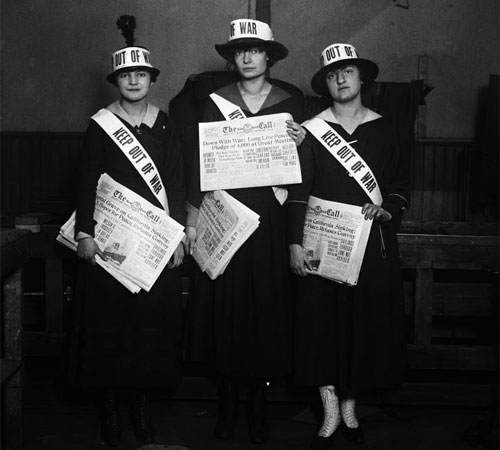
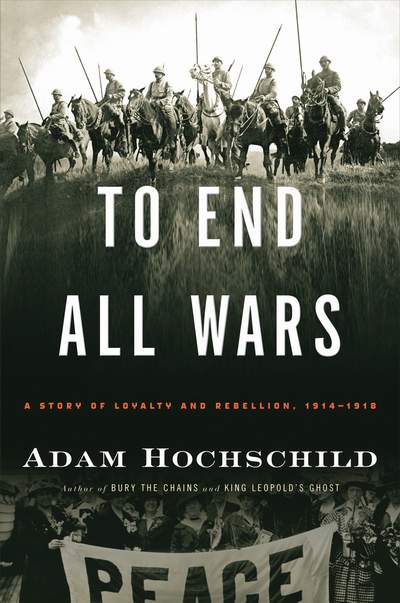
TO END ALL WARS: A Story of Loyalty and Rebellion 1914-1918
We welcome returning guest Adam Hochschild, historian and author of the new book TO END ALL WARS: A Story of Loyalty and Rebellion 1914-1918. In the book, Hochschild has focused on the antiwar movement in Great Britain. Near the beginning of World War I, 20 thousand British men refused the military draft on principle, others were conscientious objectors and nearly 6 thousand of the men were sent to prison. Hochschild relied on personal letters, diaries and memoirs to assemble this unique historic report on Britain’s powerful anti-war movement. The book also unearths how anti-war activists were monitored constantly by civilian and military intelligence as agent provocateurs bragged about their accomplishments. To End All Wars is a compelling account of the heroic anti-war struggle while top writers in that period such as Rudyard Kipling and H.G. Wells, contributed rhetoric to support the war propaganda.
Adam Hochschild:
- I always like to think we can learn things from history. I think you learn to be inspired by people who stuck to their ideals, even in very difficult times,
- I thought it would be a challenge to write a book centering around people who I admire tremendously although they lost, the cause that they were struggling for. I’ve always been fascinated by the first World War, which remade the world for the worst in every conceivable way and killed around 20 million people in the process.
- I’ve been particularly struck by those resisted that war on both sides, who said this war is not worth these millions of lives and we’re not going to fight.
- I wanted to talk about 2 different people in this war, the generals who fought this terrible war filled with illusions, that the next battle would bring a great victory, and then I was also fascinated by these pacifists and war resistors.
- 20 thousand men of military age, refused to go into the British Army. The largest outright refusals in any of the warring countries. Of that number many of them accepted alternative service under conscientious objector. Driving ambulances, or work in war industry factory.
- Many men refused that and more than six thousand went to prison.
- Aggression among Germany and Austria-Hungary did really ignite the war. You can’t really say its a war between good guys and bad guys, because the allies at first were Britain and France allied with Russia. The absolute last remaining monarchy in Europe.
- Wonderful trilogy of novels by Pat Barker, The Eye In the Doors. Had I been alive in that time in 1917, I would like so many people did at that time, who greeted the Russian Revolution with enormous hope.
- I guess I’m thinking more than anything else, of the way the first world war, made the second world war almost certain. There was something about the way the war ended that gave rise to bitterness and the Nazis in Germany.
- Right up to the very last minute, the German people were fed a diet of totally triumphant propaganda.
- Eugene Debbs got up of his sick bed to do a speaking tour against the war. The Wilson administration charged him with subversion, he was still in prison when got nearly a million votes for president of a Socialist party ticket.
- Illusion that the war is going to solve more problems than it causes. Another illusion is that it will be over quickly, you remember George Bush on the aircraft carrier.
Guest – Adam Hochschild, award-winning author and journalist who has written for The New Yorker, Harper’s, The New York Review of Books, and The New York Times Magazine. His books, King Leopold’s Ghost: A Story of Greed, Terror, and Heroism in Colonial Africa (1998) and Bury the Chains (2005) were finalists for the National Book Award and have won numerous other prizes. Hochschild teaches narrative writing at the Graduate School of Journalism at the University of California at Berkeley.
—————————————————-
Afghanistan War, Civil Liberties, Criminalizing Dissent, FBI Intrusion, Habeas Corpus, Human Rights, Surveillance, Targeting Muslims, Torture, Truth to Power
Podcast: Play in new window | Download
Updates:
—————
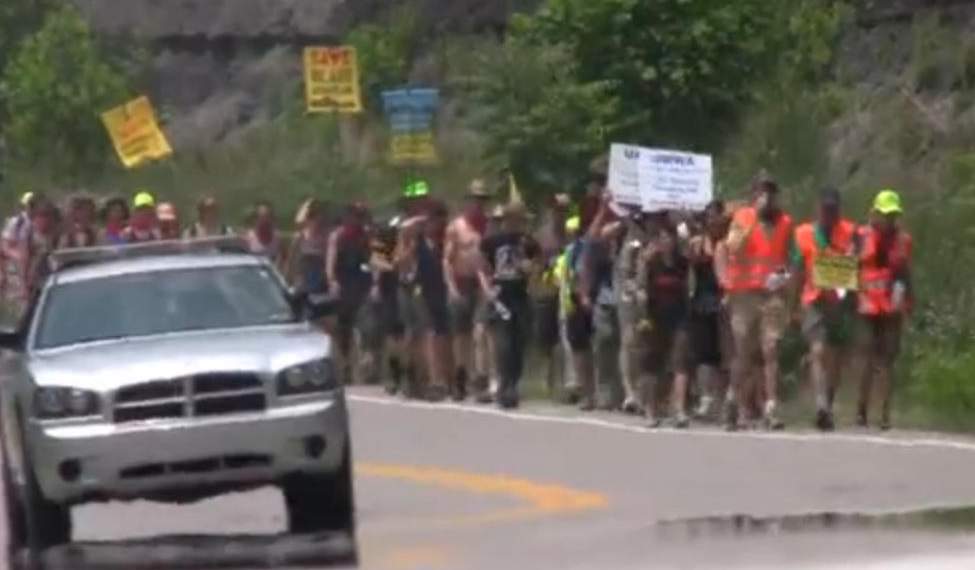

Blair Mountain March
In protest to stop mountain top removal mining, hundreds of activists finished a five day fifty mile march earlier this month from Marmet, West Virginia to Blair Mountain in West Virginia. The massive under publicized march also marked the historic Battle of Blair Mountain, the largest armed conflict in US labor history. In 1921, thousands of miners near the area marched to organize non-union coal mines. This demonstration ended in a rally of speakers, musicians, celebrities, union workers and picketing at the top of Blair mountain. The demonstration drew attention to the demand of sustainable job creation in all Appalachian communities, abolish mountaintop removal, strengthen labor rights and preserve Blair Mountain. As many listeners know, mountain top removal is a highly destructive extraction coal mining process with usually no environmental remediation.
Attorney Dan Gregor:
- It is not an exaggeration to say that big coal owns southern Virginia.
- Logan and Boone Counties where we walked through, big coal has more or less owned the politics, the citizenry, the economy for a century.
- The Congressional Delegation is very sympathetic to what they perceive as coal jobs.
- During the marches we had 200-250 people at any given time.
- Putting myself in the best way that I can do legal support, and one of the core logistics organizer of the event, best do organizing support, it put myself in a position where I was knowingly arrestable.
- It was alternately exciting and freeing and terrifying. It’s a very activist lawyer, resistance approach.
- There are locals who don’t understand this doesn’t mean more jobs or it means a fraction of unionized jobs for organized coal workers.
- The Boone County Sheriff department was somewhat less then helpful. For the most part, the West Virginia State Police were professional and did their jobs carefully. We didn’t see police misconduct, or police brutality as you would see in most mass protest situations.
- The broader strategy is calling for an end to mountain top removal coal mining, transitioning to a cleaner economy with wind and solar.
- One of the reasons you don’t see mountain tops blown up in Tennessee for example, is that the Congressional Delegation there, has been resistant to it, in West Virginia, historically it hasn’t.
- Mountain top removal coal mining produces very high quality, pure Anthracite Coal, this is part of Obama’s “Clean Coal” strategy.
- A great deal of my practice is resistance law, and is assisting resisting communities.
- I’ve been able to make this a significant focus of my life as an attorney.
- Ilovemountains.org / allianceforapplachia.org
- We can always use more people, more attorneys. It took six months to organize this March on Blair Mountain, no ordinary task for volunteers.
Guest – Dan Gregor, activist attorney whose practice includes protest defense, criminal defense, immigration, and human and civil rights law. This has included assisting and representing activists involved with the annual School of the Americas Watch vigil, the Immigrant Workers Freedom Ride, people being harassed by Green Scare grand juries, and many other activist causes. Dan is a graduate of Northeastern University School of Law and Hampshire College. He is an active member of the National Lawyers Guild, and former National Vice President of the Guild.
——————
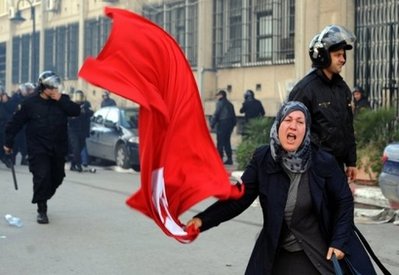
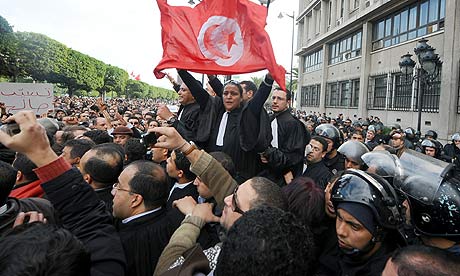
National Lawyers Guild Report: Human Rights In Tunisia
A wave civil resistance continues throughout the country of Tunisia, Africa sparked from high unemployment, food inflation, corruption, and lack of freedom of speech. During the country’s civil unrest, President Zine El Abidine Ben Ali was ousted as president, fleeing to Saudi Arabia after 23 years in power. Now, human rights violations are being investigated. A group of lawyers from the U.S., U.K. and Turkey have been investigating U.S. and European complicity in human rights abuses committed by the Ben Ali regime. The group has recently issued a warning that the U.S. and other Western governments must respect Tunisian sovereignty and not interfere in that country’s path to democracy. Atlanta attorney and National Lawyers Guild Executive Vice President Azadeh Shahshahani, was a member of the delegation and is on a speaking tour.
Azadeh Shahshahani:
- The Tunisian government passed this law, the 2003 anti-terror act. US State Department very supportive.
- If you go back to look at the US State Department Human Rights report on this, you can see the human rights violations are documented in the reports.
- It’s not like the US government didn’t know what was happening in those jails. Particularly the Islamists, after the legislation went into effect, a lot of people were picked up, for being a Muslim, for being a devout, perhaps engaging in religious discussions with your friends,
- A lot of youth were arrested and subjected to torture. Torture seemed to be really systematic, you’re arrested, detained, then tortured and confession is obtained.
- One family of a young man arrested, the father asked authorities why his son was arrested, he hasn’t done anything? They said, well, he does pray, doesn’t he?
- That was the sole basis of having been picked up. Arrests: one per day under the auspices of the Tunisian 2003 anti-terror act.
- Revolution in Saudi Arabia? Michael Ratner: That could the greatest thing that could happen.
- This “war on terror” provided the Ben Ali regime, was an enabling mechanism and justification to continue his repressive tactics.
Guest – Azadeh Shahshahhani, the Director of the National Security/Immigrants’ Rights Project at the ACLU of Georgia. The project is aimed at bringing Georgia and its localities into compliance with international human rights and constitutional standards in treatment of refugee and immigrant communities, including immigrant detainees. To that end, a variety of strategies are employed, including the development of impact litigation, legislative advocacy, providing training to attorneys, human rights documentation and the publishing of reports, public education, and coalition and movement building. The current focus areas of the project include: immigration detention, racial profiling and local enforcement of immigration laws, governmental surveillance, discrimination faced by Muslim, Middle Eastern, and South Asian communities, immigrant access to higher education, and language access in the court setting.
——————————————————























